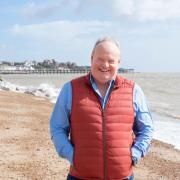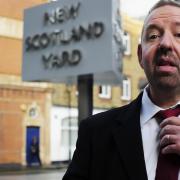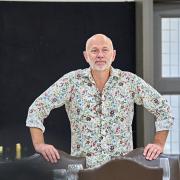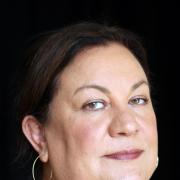Former Ipswich Town and England captain Mick Mills is now the Suffolk ambassador for the Sir Bobby Robson Foundation. Terry Hunt talked to Mills about the charity, about his football career, but most of all about his deep love of Suffolk
Former Ipswich Town captain Mick Mills is now the Suffolk ambassador for the Sir Bobby Robson Foundation, the phenomenally successful cancer charity launched by the legendary football manager 18 months before he died. Terry Hunt talked to Mills about the charity, about his football career, but most of all about his deep love of Suffolk
Mick Mills is as far removed from the brash stereotype of modern-day footballers as it is possible to imagine. Neatly dressed, quietly spoken, and thoughtful, the former Ipswich Town and England captain’s persona is as much that of a successful businessman as a footballing legend.Here in Suffolk, of course, he is still instantly recognisable as the man who led Bobby Robson’s Ipswich teams through the most successful period in the club’s history, during the 1970s and early 1980s.Now in his early 60s, Mills keeps himself in trim with regular golf, walking his German Shepherd dogs, and some road running. He looks as lean as he did during his record 741 appearances for Ipswich. And, of course, the trademark moustache is still firmly in place!Although originally from Surrey, Mills has spent the vast majority of his adult life living in Suffolk. He moved to Ipswich in 1965, aged just 16, when his first club, Portsmouth, closed its youth scheme. It is a decision which he has never regretted, either professionally or personally.On the football pitch, Mills’ time at Ipswich saw the club enjoy sustained success during the 1970s and into the 1980s, capturing the FA Cup in 1978 and the UEFA Cup three years later. The team finished out of the top six of Division One only once in ten seasons, and came very close to being crowned league champions on a number of occasions. On a personal level, Mills won 42 England caps, and led his country in the 1982 World Cup Finals.Away from football, Mick Mills loves Suffolk as much as Suffolk loves Mick Mills. But it’s certainly not to the bright lights that he’s attracted. You are much more likely to bump into him in some quiet Suffolk market town, or walking his dogs on a remote stretch of our beautiful coastline.Mills and his wife Sue live in a picturesque house, north of Ipswich, which really is in the middle of nowhere – even by Suffolk standards. He’s proud to own an acre of Suffolk, which is surrounded by rolling fields, perfect for strolling, with or without the dogs.“We love the smaller towns, like Woodbridge and Framlingham’’ he says. “We use them very frequently, whether it’s for shopping or just for a stroll or a coffee and a sandwich. We like Felixstowe as well, and Beccles, where my wife was brought up. That really is a smashing old town. It reminds me of Godalming, where I grew up.’’One of the best things about Suffolk, he says, is that folk let even the famous get on with their lives without harassing them. Someone as iconic as Mills could not stroll around on Merseyside, or Tyneside, where football fans tend to be, how shall we say, a bit more “in your face.’’“People around here are very down to earth,’’ he says, “They’re very relaxed, and they treat everyone the same, no matter who they are.’’Mind you, there are times, he says, when it’s good to be recognised. “I remember going into the newsagent’s in Debenham to buy a newspaper and the lady behind the counter said: ‘Well, look who it is. I must tell father. So she got her father to come through. He was a real football man, and we had a nice conversation.’ ’’Mills also loves and appreciates the Suffolk coast, especially the remote spots.“Sue and I love the beautiful coast. It’s great for getting fresh air into the lungs. Shingle Street is one of our favourite places. It always amazes me how it changes each time we go there. One of the best walks must be the one along the beach between Thorpeness and Aldeburgh.’’The couple will also take their dogs for walks in the forests at Rendlesham and Sutton Heath. Mills says they have always had German Shepherds: “These are our fifth and sixth.’’His lovely, remote home now is a far cry from his first home in Suffolk. When he arrived from Portsmouth, he was billeted in a club hostel, run by former Ipswich player Charlie Cowie and his wife in Crofton Road, Ipswich.By coincidence, years later, Mills’ three boys would all attend a small private school in the same road. As they got older, the boys moved to St Joseph’s College in Ipswich, which Mills describes as “an excellent school.’’After the club hostel closed, Mills and other young players, like Derek Jefferson, moved to digs in Anglesea Road in Ipswich, and then around various other digs in the town.As a youngster, Mills enjoyed a good social life – but nothing too wild, he recalls. “We would start at the Olive Leaf pub in St Helen’s Street and finish up at the First Floor Club in Tacket Street. No-one has ever had a better time than we did, just going to two or three places on a night out.’’
“We love the county and it’s our home. We will never move away again. So you won’t be seeing me taking a job at Carlisle United!’’
It was when Mills married Sue that they bought a house in the quiet village of Bucklesham, between Ipswich and Felixstowe. “We stayed there for the rest of my playing career.’’In 1982 his 17-year, record-breaking time at Ipswich came to an end. “It was a real wrench,’’ he recalls. “I had become so used to being able to get pretty much anywhere I wanted to go in 15 minutes or so while we were in Suffolk.’’There followed a playing spell on the south coast with Southampton – deadly rivals of his first club, Portsmouth – and then a managerial role at Stoke. Of course, these necessitated house moves away from the couple’s beloved Suffolk. It was while Mills was at Stoke that disaster struck, when their house in the Midlands was wrecked by fire.They were delighted to be able to return to Suffolk in 1996, partly to be close to Sue’s family, but also because the county is their home. Since his last job in football management and coaching, Mills has worked with a sports agency, been a football scout, done media work (he recently fronted the World Cup advertising campaign by Glasswell’s and is writing a column every Saturday in the EADT), and has also had time for two of his favourite sports: golf and horse racing.“Suffolk is great for both,’’ he says, “There are so many golf courses within easy reach of home, and they’re all very good. And, of course, we have the home of racing at Newmarket, so it doesn’t get much better!’’Mills is also proud to be the Suffolk Ambassador for the Sir Bobby Robson Foundation, the appeal set up by the former Ipswich and England manager in the last 18 months of his life to support research into cancer treatment. Sir Bobby, “The Boss’’ as all his former Ipswich players still call him, fought against cancer five times before dying on the last day of July 2009.Mills explained how his role had come about. “The biggest amounts of money for the Foundation are being raised in the North-East, but by far the second biggest area is Suffolk. The Foundation wanted someone to raise the profile here in Suffolk, and my name came up.’’One of his tasks will be to organise events in Suffolk to raise money for Sir Bobby’s cause, and Mills says a number of fund-raising events are already in the pipeline locally.With Sir Bobby sadly no longer with us, Mills will now become the focal point for Ipswich Town nostalgia, such as reunions of the successful teams from the 1970s and 1980s. It is a fact that he recognises, and is comfortable with. In his quiet and modest way, he has great pride in his achievements at Portman Road.He describes the FA Cup victory in 1978 as “my best moment in football. Although I’d played at Wembley lots of times before with England, going there with Ipswich was like going with family. It was deeper, it meant more.’’Every moment – good, bad, indifferent – from his glorious Ipswich years is etched deeply into Mills’ brain. Ask him any question, about any game, from any season, and he will have instant recall. He doesn’t need prompting. His worst footballing moment? Easy. The 1975 FA Cup semi-final defeat to West Ham when referee Clive Thomas disallowed two Bryan Hamilton “goals.’’ “They were both perfectly good goals,’’ says Mills. Another bad moment – his only dismissal, against Lokomotiv Leipzig in the UEFA cup quarter-final in 1973, leaving his team to battle against the odds and eventually lose cruelly on penalties. Even now, Mills’ sense of natural justice is offended by that decision: “I didn’t deserve it, I just got a challenge slightly wrong.’’The best Ipswich player? He agrees with the fans’ polls which always put Kevin Beattie at the pinnacle. “Awesome player,’’ but he adds perspective, “But he didn’t always have the best first touch.’’ Alf Ramsey? “He was everything everyone ever said about him – definitely a bit cold.’’His relationship with Robson? “I wasn’t a yes man, he knew I would never be that. I suppose I was the buffer between him and the players. I told him that I was with him but also with the players. He supported me, and I supported him. It worked.’’What about ambition? Despite his wonderful lifestyle, it still burns brightly in Mick Mills, and a part of him still yearns for the pressure cooker that is the world of professional football. “I would love to have one more go,’’ he says, “Not necessarily as a manager – I always enjoyed the assistant manager role. I have a lot of experience and I still feel I have something to offer.’’But any return to football certainly wouldn’t be at the expense of moving from their wonderful Suffolk home, and lifestyle.“No,’’ says Mills, “We made a decision to come back to Suffolk, we love the county and it’s our home. We will never move away again. So you won’t be seeing me taking a job at Carlisle United!’’


























